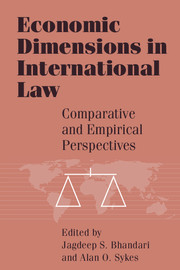Book contents
- Frontmatter
- Contents
- Preface
- Introduction: Economics and international law
- 1 The economics of the most favored nation clause
- 2 The economics of “injury” in antidumping and countervailing duty cases
- 3 The economics of “injury” in antidumping and countervailing duty cases: A reply to Professor Sykes
- 4 Innovations in support of the unitary injury test in U.S. unfair trade cases
- 5 The free trade–fair trade debate: Trade, labor, and the environment
- 6 International conflict and coordination in environmental policies
- 7 Market modernization of law: Economic development through decentralized law
- 8 Toward a positive theory of privatization: Lessons from Soviet-type economies
- 9 New stories on exchange rate policies in transition
- 10 Is deposit insurance inevitable? – lessons from Argentina
- 11 The market for migrants
- 12 The interplay of liquidation and reorganization in the bankruptcy systems of Canada and the United States: The role of screens, gatekeepers, and guillotines
- 13 International political economy approaches to international institutions
- 14 The trade effects of domestic antitrust enforcement
- 15 The Hartford Insurance Company case: Antitrust in the global economy – welfare effects and sovereignty
- 16 Recognition of foreign judgments as a trade law issue: The economics of private international law
- 17 Externalities and extraterritoriality: The law and economics of prescriptive jurisdiction
- Index
3 - The economics of “injury” in antidumping and countervailing duty cases: A reply to Professor Sykes
Published online by Cambridge University Press: 05 December 2011
- Frontmatter
- Contents
- Preface
- Introduction: Economics and international law
- 1 The economics of the most favored nation clause
- 2 The economics of “injury” in antidumping and countervailing duty cases
- 3 The economics of “injury” in antidumping and countervailing duty cases: A reply to Professor Sykes
- 4 Innovations in support of the unitary injury test in U.S. unfair trade cases
- 5 The free trade–fair trade debate: Trade, labor, and the environment
- 6 International conflict and coordination in environmental policies
- 7 Market modernization of law: Economic development through decentralized law
- 8 Toward a positive theory of privatization: Lessons from Soviet-type economies
- 9 New stories on exchange rate policies in transition
- 10 Is deposit insurance inevitable? – lessons from Argentina
- 11 The market for migrants
- 12 The interplay of liquidation and reorganization in the bankruptcy systems of Canada and the United States: The role of screens, gatekeepers, and guillotines
- 13 International political economy approaches to international institutions
- 14 The trade effects of domestic antitrust enforcement
- 15 The Hartford Insurance Company case: Antitrust in the global economy – welfare effects and sovereignty
- 16 Recognition of foreign judgments as a trade law issue: The economics of private international law
- 17 Externalities and extraterritoriality: The law and economics of prescriptive jurisdiction
- Index
Summary
The basic inquiries in legal proceedings are what happened and why. The evolution of legal systems is the story of efforts to devise better ways of answering these questions. Trial by jury may not provide answers we can accept with absolute confidence, but the use of peers chosen from the community to listen to and evaluate evidence germane to these inquiries seems eminently preferable to trial by combat or trial by ordeal as a mechanism for ascertaining truth.
In recent years, methods of ascertaining what happened and why in international trade cases have been debated, partly on grounds of their accuracy (ability to discern the truth) and partly on grounds of their fidelity to law (whether they ask the right question). This debate has been especially intense in respect to determinations of the U.S. International Trade Commission (ITC), which is charged with administering the “injury test” under the U.S. antidumping and countervailing duty laws.
Two different inquiries are required by these laws. The International Trade Administration of the Department of Commerce (ITA) must determine whether the imports under investigation embody an “unfair trade practice” – whether they are sold into the United States at “less than fair value” (dumped) or are unfairly subsidized – a what happened question.
The ITC must decide whether the complaining U.S. industry is materially injured “by reason of” sales of such unfairly priced or unfairly subsidized imports (both a what happened and a why inquiry).
- Type
- Chapter
- Information
- Economic Dimensions in International LawComparative and Empirical Perspectives, pp. 126 - 165Publisher: Cambridge University PressPrint publication year: 1998
- 4
- Cited by



